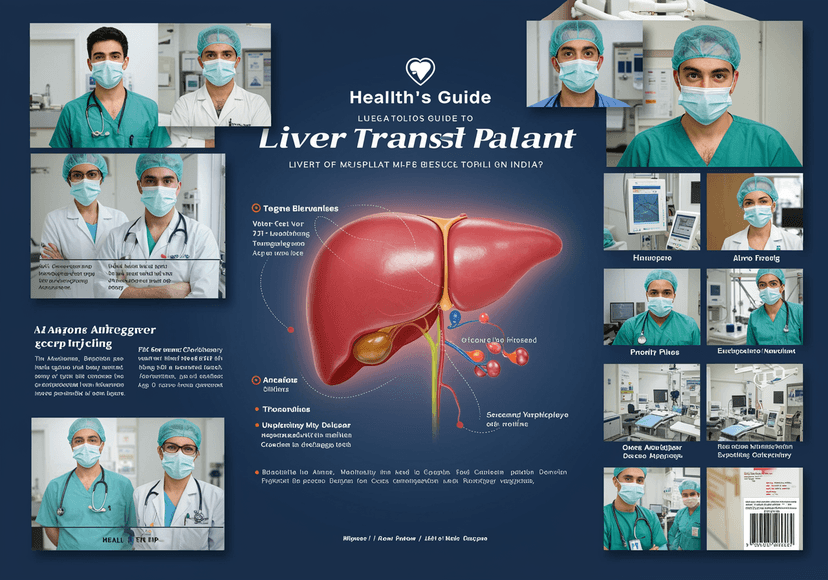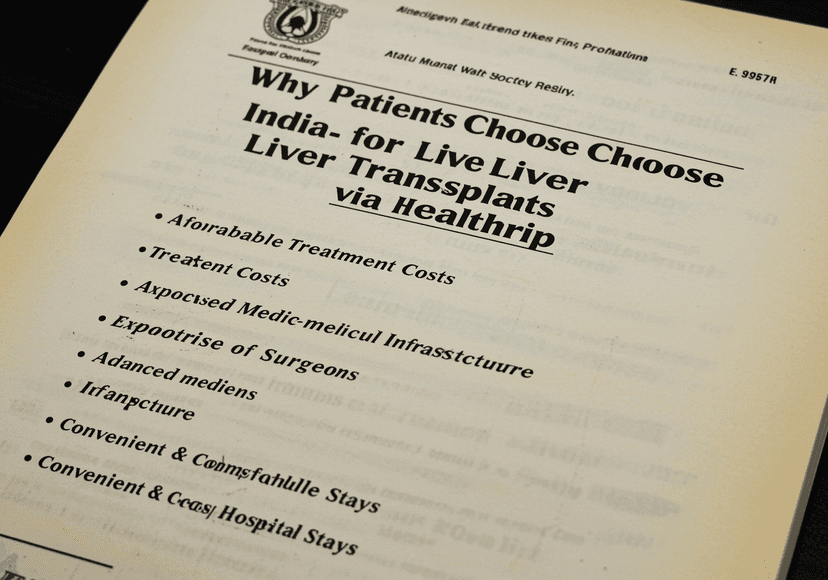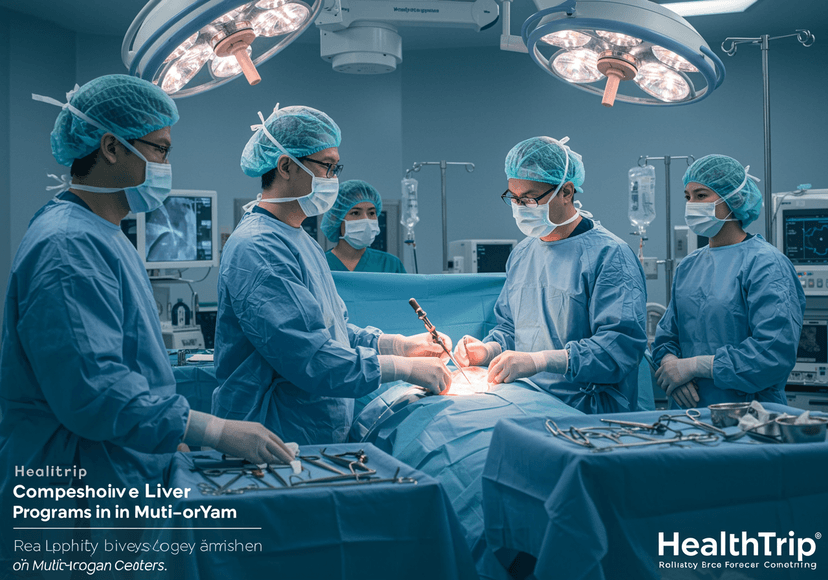
Liver Transplant for Cirrhosis Patients: Risks, Benefits
15 Sep, 2023
 Healthtrip Team
Healthtrip TeamIntroduction
Liver cirrhosis is a serious and progressive condition where healthy liver tissue is replaced by scar tissue, leading to impaired liver function. While cirrhosis can be managed with medications and lifestyle changes, in some cases, a liver transplant becomes the only viable option. This blog will explore the risks and benefits of liver transplants for cirrhosis patients, shedding light on this life-saving procedure.
Most popular procedures in India
A. Understanding Cirrhosis
Before delving into liver transplants, it's essential to grasp the gravity of cirrhosis. Common causes of cirrhosis include chronic alcohol abuse, viral hepatitis, non-alcoholic fatty liver disease (NAFLD), and autoimmune diseases. As the liver's ability to function deteriorates, patients may experience symptoms like fatigue, jaundice, fluid retention, and confusion.
Wellness Treatments
Give yourself the time to relax
Lowest Prices Guaranteed!

Lowest Prices Guaranteed!
B. The Need for Liver Transplantation
1. Life-Saving Potential:
Liver transplant is often the last resort for cirrhosis patients when other treatments fail. It offers the hope of extending their life and improving their quality of life significantly.
2. Restoring Liver Function:
A transplant replaces the damaged liver with a healthy one, allowing the recipient's body to regain normal liver function. This can alleviate or eliminate symptoms and complications associated with cirrhosis.
C. Benefits of Liver Transplantation
1. Improved Quality of Life:
Successful liver transplant recipients often experience a dramatic improvement in their overall quality of life. They regain energy, can return to work, and participate in activities they once enjoyed.
2. Longevity:
Liver transplants can significantly extend the life expectancy of cirrhosis patients, offering the possibility of a normal lifespan with proper care and adherence to post-transplant medical regimens.
3. Resolution of Complications:
Liver transplantation can resolve complications such as ascites (fluid buildup in the abdomen), hepatic encephalopathy (confusion and cognitive issues), and variceal bleeding, which are common in advanced cirrhosis.
D. Risks Associated with Liver Transplantation
- Surgical Risks: Like any major surgery, liver transplantation carries inherent risks, such as bleeding, infection, and adverse reactions to anesthesia. However, transplant surgeons and medical teams are highly skilled at managing these risks.
- Rejection: The recipient's immune system may recognize the transplanted liver as foreign tissue and attempt to attack it. To prevent this, lifelong immunosuppressive medications are required, which can have side effects and increase the risk of infections.
- Organ Shortage: The availability of suitable donor livers is limited, leading to waiting lists and the potential for patients to deteriorate while waiting for a transplant.
- Costs and Recovery: Liver transplantation is an expensive procedure, and the recovery process can be lengthy and challenging, requiring ongoing medical monitoring and lifestyle adjustments.
E. The Evaluation Process
Before a patient is deemed eligible for a liver transplant, they must go through a rigorous evaluation process. This assessment involves a comprehensive medical and psychological evaluation to determine if they are physically and mentally prepared for the procedure and the post-transplant lifestyle.
1. Medical Evaluation:
This entails a battery of tests, including blood tests, imaging scans, and liver function assessments, to gauge the extent of liver damage and overall health. Doctors also assess the patient's ability to tolerate surgery and their likelihood of success post-transplant.
2. Psychosocial Evaluation:
Mental and emotional health plays a crucial role in the success of a liver transplant. Evaluators look for signs of depression, substance abuse, or other factors that could impact adherence to the necessary medications and lifestyle changes.
3. Social Support:
Patients need a strong support system to help them through the transplantation process. Having family or friends who can provide emotional and practical support is essential.
F. Waiting for a Donor Liver
One of the most challenging aspects of liver transplantation is the wait for a suitable donor organ. Due to a shortage of available organs, patients may spend months or even years on the transplant waiting list. During this time, they continue to receive medical care to manage their condition and remain as healthy as possible.
G. Surgery and Recovery
When a suitable donor liver becomes available, the transplant surgery takes place. The procedure can take several hours and involves removing the patient's damaged liver and replacing it with a healthy donor organ. After surgery, the patient is closely monitored in the intensive care unit before transitioning to a regular hospital room.
Recovery from liver transplantation is a gradual process. Patients typically spend several weeks in the hospital, and then they must adhere to a strict post-transplant regimen, including:
a. Immunosuppressive Medications:
Lifelong use of immunosuppressive drugs is necessary to prevent rejection of the new liver. These medications reduce the immune system's response, which can leave patients more susceptible to infections and other side effects.
b. Regular Medical Follow-ups:
Patients need ongoing medical care to monitor their liver function, medication levels, and overall health. This helps catch and address any potential issues early.
c. Lifestyle Changes:
Patients are advised to adopt a healthier lifestyle, including avoiding alcohol, maintaining a balanced diet, and staying physically active. They should also adhere to their medication schedule.
Conclusion
- Liver transplantation offers hope to cirrhosis patients who have exhausted other treatment options. While it comes with risks and challenges, the benefits, such as improved quality of life and increased longevity, can be life-changing. The decision to undergo a liver transplant should be made after careful consideration, in consultation with a medical team experienced in transplant care.
- Continued research and advancements in medical science are continually improving the success rates and outcomes of liver transplantation, providing optimism for those facing advanced liver disease. For cirrhosis patients, a liver transplant can be a second chance at a healthier and more fulfilling life.
Related Blogs

Healthtrip:Explore Kidney Treatment Options in Mecca: Hospitals & Costs Compared
Healthtrip

Healthtrip's Guide to Liver Transplant Medical Tourism in India
Complete Guide

Healthtrip: Your Guide to Leading Multi-Organ Transplant Centers
Healthtrip

Why Patients Choose India for Liver Transplants via Healthtrip
Healthtrip

Healthtrip: Comprehensive Liver Surgery Programs in Multi-Organ Centers
Healthtrip Transplant Centers

Healthtrip: Access World-Class Liver Transplant Specialists Globally
Medical Tourism Experts










